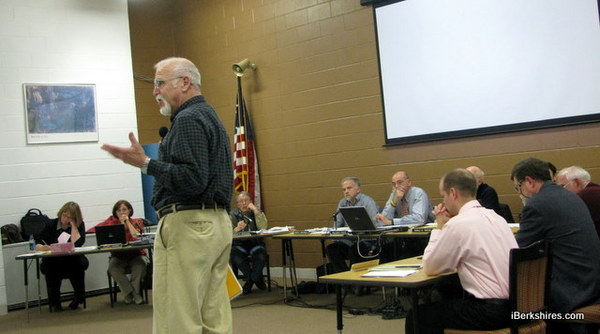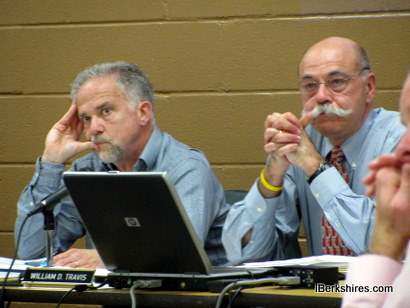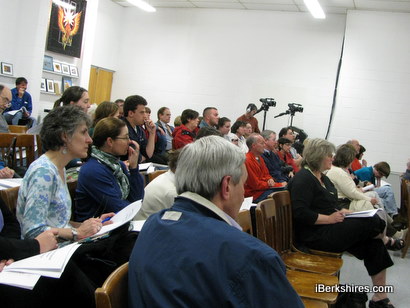
Lanesborough: Mount Greylock School Costs Crushing
 School Committee Chairman David Archibald, left, and Superintendent William Travis listen to district residents' speak on the budget. |
Lanesborough's assessment to the regional school district is expected to rise 11 percent next year, some $254,000, as the town's enrollment in the middle and high school has increased. At the same time, the small town's been cutting back and telling its own departments to level fund for the coming year.
Lanesborough Town Administrator Paul Boudreau and Finance Committee Chairman William Stevens urged the School Committee to consider the impact of the assessment at Tuesday's public hearing on the budget.
"It would require us to make some very significant cuts in various departments," Boudreau told the School Committee. "We've all got limited resources and we're trying to do our best in very hard times ... the situation in Lanesborough is quite dire."
Stevens said he was "a little bit incensed" to learn that the district would ask for a debt exclusion on its $50,000 annual payments on roof repairs, thereby taking the payment out of the operating budget but not off the table.
The town's struggling to get within the tax levy limit, he said. "Now, with the $248,000 from Greylock we're only $178,000 over the levy limit. Then I heard $248,000 — plus $16,000 for debt exclusion.
"Debt exclusion money is not free money," Stevens continued. "We've got to pay for it through our pockets ... I don't know where it's going to come from."
Several Williamstown residents defended the School Committee's oversight of the budget, which has been pared away over the past several years. "We're chipping away at our children's education," said Wendy Penner.
William Overstreet said the school district was trying to absorb some $500,000 in unanticipated costs in a tough budget year.
 About 50 people attended the hearing at the high school but only a handful spoke. |
Mount Greylock's been hit by cuts in state Chapter 70 funding and state transportation aid and increases in special education costs — particularly in residential placements. Over the past few weeks, the School Committee and administration identified nearly $600,000 in possible cuts, coming up with $278,000 that could be taken without affecting curriculum. Counting in the $50,000 payment on the roof, the budget is up 2.13 percent over this year.
"We are at rock bottom, with the sense that any further cuts will have an impact on the education of our children," said business manager Ellen Kaiser. "It hurt. I think we'll be able to maintain most of our programs ... but anymore will have a significant affect on this building."
School Committee Chairman David Archibald said he could empathize with Lanesborough's position.
"It's the way the agreement's structured," he said. "It's important that you know Lanesborough is not whining. They really got whacked by the budget two years in a row."
The committee approved a $10.1 million budget with updated figures that saw Lanesborough's assessment rise another $6,000. Williamstown's assessment is $4.62 million, up $201,448 from last year, plus $33,600 for its portion of the roof repair payment; Lanesborough's came to $2.55 million, plus $16,213 for the debt payment.
The numbers could change but the budget was approved for the Williamstown town meeting on May 18; Lanesborough's town meeting will be held a month later than usual. School Committee members expected to meet with the Lanesborough Selectmen and Finance Committee once more.
Both sides needed to work together to find solutions, said Williamstown Finance Committee Chairwoman Suzanne Dewey.
"I hate to see neighboring towns that care deeply about this school get into a district meeting situation which will bring ill will to the school and to one another."















